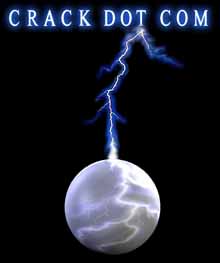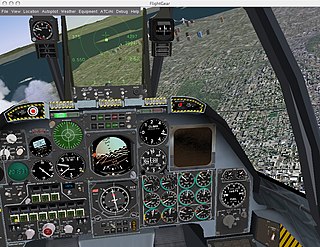 | |
| Type | Video game industry |
|---|---|
| Founded | 1996 |
| Defunct | 1998 |
| Products | Abuse |
Crack dot Com was a computer game development company co-founded by ex-id Software programmer Dave Taylor, and Jonathan Clark. [1]
 | |
| Type | Video game industry |
|---|---|
| Founded | 1996 |
| Defunct | 1998 |
| Products | Abuse |
Crack dot Com was a computer game development company co-founded by ex-id Software programmer Dave Taylor, and Jonathan Clark. [1]
Crack dot com started from home with a staff of just four people. [2] Their first completed game, which had Internal Revenue Service agents as the enemies, was never released. [2] The company released only one game, Abuse , an MS-DOS scrolling platform shooter which sold over 80,000 copies worldwide. Based on a public source code release, Abuse was ported to a wide variety of platforms including Microsoft Windows, MacOS, AIX, SGI Irix, Amiga/AmigaOS, and Linux. [3]
Prior to the company's closing in October 1998, [4] they were working on Golgotha , a hybrid of first-person shooter and real-time strategy. Citing publisher interference in the creative design of Abuse, Crack dot com opted not to accept any offers from publishers until the game was completed. [2] The game was never finished and Crack dot com made the source and data for Golgotha (as with Abuse) public domain.
The company experienced a setback on January 13, 1997 [5] when their file server was broken into by way of their web server, [6] and the source code to Golgotha and also the Quake engine they had licensed from id was stolen. [7] This did result in a number of unofficial ports for Quake , including an SVGAlib version for Linux that was later mainlined by id, [8] as well as unauthorized ports to OS/2, Amiga, Java VMs, and Mac OS. [9] The source code for both Quake and Golgotha were later legally released. [10]

id Software LLC is an American video game developer based in Richardson, Texas. It was founded on February 1, 1991, by four members of the computer company Softdisk: programmers John Carmack and John Romero, game designer Tom Hall, and artist Adrian Carmack.

Quake II is a 1997 first-person shooter video game developed by id Software and published by Activision. It is the second installment of the Quake series, following Quake. The game's storyline is continued in its expansions and Quake 4.

Quake is a first-person shooter game developed by id Software and published by GT Interactive. The first game in the Quake series, it was originally released for MS-DOS, Microsoft Windows and Linux in 1996, followed by Mac OS and Sega Saturn in 1997 and Nintendo 64 in 1998. In the game, players must find their way through various maze-like, medieval environments while battling monsters using an array of weaponry. Quake takes inspiration from gothic fiction and the works of H. P. Lovecraft.

John D. Carmack II is an American computer programmer and video game developer. He co-founded the video game company id Software and was the lead programmer of its 1990s games Commander Keen, Wolfenstein 3D, Doom, Quake, and their sequels. Carmack made innovations in 3D computer graphics, such as his Carmack's Reverse algorithm for shadow volumes.
In computing, cross-platform software is computer software that is designed to work in several computing platforms. Some cross-platform software requires a separate build for each platform, but some can be directly run on any platform without special preparation, being written in an interpreted language or compiled to portable bytecode for which the interpreters or run-time packages are common or standard components of all supported platforms.

Quake 4 is a 2005 military science fiction first-person shooter video game developed by Raven Software and published by Activision. It is the fourth title in the Quake series, after the multiplayer Quake III Arena, and a sequel to Quake II. Raven Software collaborated with id Software, who supervised the development of the game as well as provided the id Tech 4 engine upon which it was built. The game has an increased emphasis on single-player gameplay compared to previous installments; its multiplayer mode does not support playable bots.

Nmap is a network scanner created by Gordon Lyon. Nmap is used to discover hosts and services on a computer network by sending packets and analyzing the responses.
A source port is a software project based on the source code of a game engine that allows the game to be played on operating systems or computing platforms with which the game was not originally compatible.

Hyperion Entertainment CVBA is a Belgian software company which in its early years focused in porting Windows games to Amiga OS, Linux, and Mac OS. In 2001, they accepted a contract by Amiga Incorporated to develop AmigaOS 4 and mainly discontinued their porting business to pursue this development. AmigaOS 4 runs on the AmigaOne systems, Commodore Amiga systems with a Phase5 PowerUP accelerator board, Pegasos II systems and Sam440/Sam460 systems.
Dave D. Taylor is an American game programmer, best known as a former id Software employee and noted for his work promoting Linux gaming.
These tables provide a comparison of operating systems, of computer devices, as listing general and technical information for a number of widely used and currently available PC or handheld operating systems. The article "Usage share of operating systems" provides a broader, and more general, comparison of operating systems that includes servers, mainframes and supercomputers.

Abuse is a run and gun video game developed by Crack dot Com and published by Electronic Arts in North America and Origin Systems in Europe. It was released on February 29, 1996 for MS-DOS. A Mac OS port of the game was published by Bungie and released on March 5, 1997. The game's source code, along with some of the shareware content, has been in the public domain since the late 1990s and has been ported to Linux and many other platforms.

id Tech 3, popularly known as the Quake III Arena engine, is a game engine developed by id Software for their video game Quake III Arena. It has been adopted by numerous games. During its time, it competed with the Unreal Engine; both engines were widely licensed.

An open-source video game, or simply an open-source game, is a video game whose source code is open-source. They are often freely distributable and sometimes cross-platform compatible.

Hopkins FBI is a 1998 point-and-click adventure game from MP Entertainment, most famous for very large amounts of gore. A sequel titled Hopkins FBI 2: Don't Cry, Baby, involving Hopkins having to rescue the President's daughter, was announced but never released.
The operating system GNU/Linux can be used for playing video games. Because many games are not natively supported for the Linux kernel, various software has been made to run Windows games, such as Wine, Cedega, and Proton, and managers such as Lutris and PlayOnLinux. The Linux gaming community has a presence on the internet with users who attempt to run games that are normally not supported on Linux.

Ryan C. Gordon is a computer programmer and former Loki Software employee responsible for icculus.org, which hosts many Loki Software projects as well as others. Gordon's site hosts projects with the code from such commercial games as Duke Nukem 3D, Shadow Warrior, Quake III Arena and other free and open source projects for multiple platforms.

id Tech is a series of separate game engines designed and developed by id Software. Prior to the presentation of the id Tech 5-based game Rage in 2011, the engines lacked official designation and as such were simply referred to as the Doom and Quake engines, from the name of the main game series the engines had been developed for. "id Tech" has been released as free software under the GNU General Public License. id Tech versions 0 to 3 were released under GPL-2.0-or-later. id Tech versions 3.5 to 4.5 were released under GPL-3.0-or-later. id Tech 5 to 7 are proprietary, with id Tech 7 currently being the latest utilized engine.

Timothée Besset is a French software programmer, best known for supporting Linux, as well as some Macintosh, ports of id Software's products. He has been involved with the game ports of various id properties over the past ten years, starting with Quake III Arena. Since the development of Doom 3 he was also in charge of the multiplayer network code and various aspects of game coding for id, a role which had him heavily involved in the development of their online game QuakeLive.